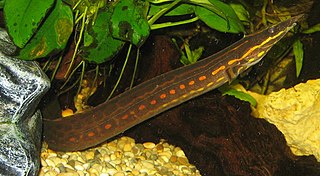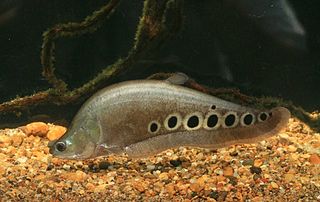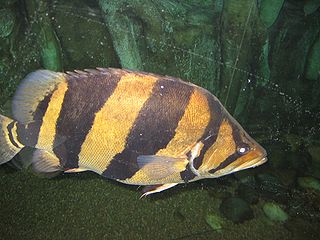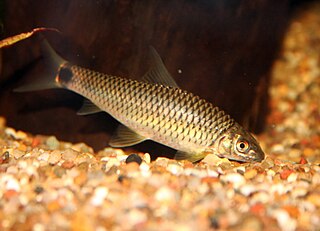
The Mekong giant catfish, is a large, threatened species of catfish in the shark catfish family (Pangasiidae), native to the Mekong basin in Southeast Asia and adjacent China. It is considered critically endangered due to overfishing and habitat loss.

The giant barb, Siamese Giant carp, or simply Siamese carp is the largest species of cyprinid in the world. These migratory fish are found only in the Mae Klong, Mekong, and Chao Phraya River basins in Indochina. Populations have declined drastically due to habitat loss and overfishing, and the giant barb is now considered critically endangered.

The spotted houndshark is a houndshark of the family Triakidae found in tropical waters in the eastern Pacific Ocean off the coast of South America. It usually grows to a length around 180 centimetres (71 in). The reproduction of this houndshark is ovoviviparous, with a litter of 14 pups being found in one female with a birth size of 30 to 40 centimetres. Their diet is believed to consist mainly of crustaceans.

The fire eel is a relatively large species of spiny eel. This omnivorous freshwater fish is native to Southeast Asia but is also found in the aquarium trade. Although it has declined locally due to overfishing, it remains common overall.

The clown featherback, also known as the clown knifefish and spotted knifefish, is a nocturnal species of tropical fish with a long, knife-like body. This knifefish is native to freshwater habitats in Cambodia, China, Hong Kong, Laos, Macau, Thailand, and Vietnam, but it has also been introduced to regions outside its native range. It is one of the world's most invasive species.

The giant salmon carp, also termed the Mekong giant salmon carp, is a species of freshwater fish in the family Cyprinidae and the single species in the monotypic genus Aaptosyax. It is endemic to the middle reaches of the Mekong River in northern Cambodia, Laos, and Thailand. Its population is much reduced (>90%) as a result of overfishing and habitat degradation, and it is now considered Critically Endangered.

The Siamese tigerfish, also known as the Siamese tiger perch, is a species of ray-finned fish belonging to the family Lobotidae, the tripletails and tiger perches. This fish is endemic to Indochina and is assessed as Critically Endangered by the IUCN.

The Siamese mud carp is a species of freshwater cyprinid fish, a variety of Asian carp native to the Mekong and Chao Phraya Rivers in Southeast Asia, especially in Cambodia, Laos and Thailand. It is very common in floodplains during the wet season and migrates upstream in the Mekong starting in Cambodia.

Cynoglossus feldmanni, commonly known as the River tonguesole is a species of tonguefish occurring in freshwater. It is commonly found in Thailand, Laos, Borneo, Sumatra and Cambodia. It occurs in rivers in freshwater well above the tidal zone where it lives on the bottom feeding on benthic invertebrates.

The espei rasbora, or lambchop rasbora is a species of ray-finned fish in the genus Trigonostigma. It is named after the dark band that appears like a lamb chop along its body.

The Cambodian logsucker, also known as stonelapping minnow or false Siamese algae eater, is a species of ray-finned fish in the genus Garra. It lives in Southeast Asia.
Nemacheilus pallidus is a species of ray-finned fish in the genus Nemacheilus which occurs in the lower Mekong basin in Thailand, Laos, Cambodia and Vietnam, as well as in the Chao Phraya and Maeklong basins in Thailand.
Homaloptera confuzona is a species of hillstream loach in the genus Homaloptera found in Laos, Cambodia and Thailand. It lives in the lower Mekong drainage and coastal streams of Cambodia and eastern Thailand. Its maximum size is about 40 cm (16 in) SL.

Gyrinocheilus aymonieri is a freshwater fish native to large parts of Southeast Asia. It is of interest as a local food source and for the aquarium trade. Its common names include honey sucker, sucking loach and Chinese algae eater.
Longiculter siahi is a species of cyprinid fish found in Southeast Asia where it is found in Cambodia, Laos and Thailand. It is the only member of its genus. It was described by the American ichthyologist Henry Weed Fowler from two specimens collected from central Thailand in 1937. There have been no further records of this species from Thailand and there is some doubt as to the validity of this species. There have been reports of this species from Cambodia in 1985 and from southern Lao PDR but the identification has yet to be confirmed. The IUCN therefore classify this species as Data Deficient.

Shark minnow is a species of small cyprinid fish found in Southeast Asia from the Mae Klong River to the Mekong. It lives mainly in rivers, moving into flooded forests and fields during the floods and back into the river as the floods recede. It usually swims close to the surface in schools of many individuals. It is one of the most abundant of the different types of minnow-sized fishes known as pla sio in Thailand.
Pao turgidus is a species of freshwater pufferfish native to the Mekong basin. It may also occur in the Chao Phraya basin in Thailand. This species grows to a length of 18.5 centimetres (7.3 in) SL.

Crossocheilus atrilimes is a species of freshwater fish in the family Cyprinidae. It is found in Laos, in Thailand, and in Cambodia.

Crossocheilus reticulatus is a freshwater fish in the family Cyprinidae from Southeast Asia. It grows to 17 cm (6.7 in) standard length.
Macrognathus semiocellatus is a species of ray-finned fish endemic to Cambodia, Laos and Vietnam; it found in marshlands and vegetated water bodies in Mekong Chao Phraya River and Mae Klong. It spends its time during the day buried in silt, sand or fine gravel and forages at night for benthic insect larvae, crustaceans and worms.















